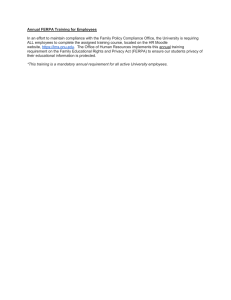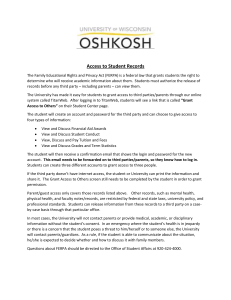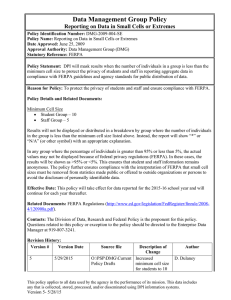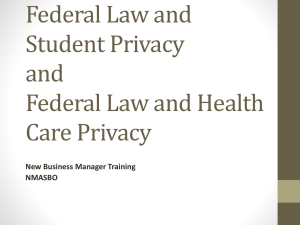OSPI Special Education Technical Assistance Paper (TAP) No. 4
advertisement
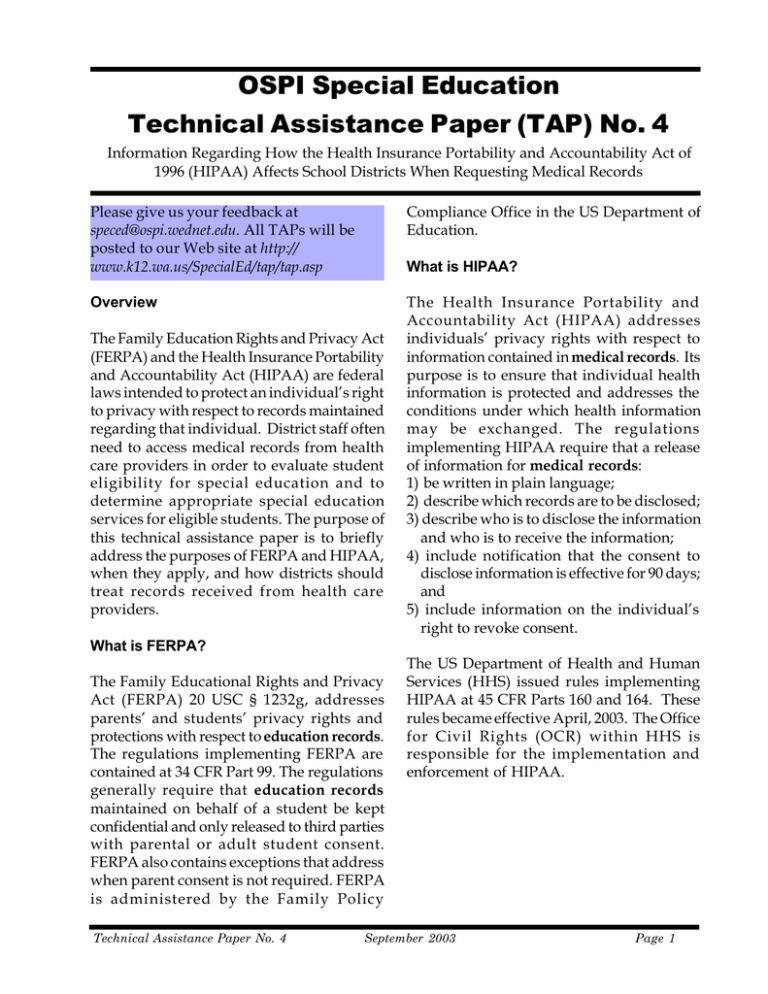
OSPI Special Education Technical Assistance Paper (TAP) No. 4 Information Regarding How the Health Insurance Portability and Accountability Act of 1996 (HIPAA) Affects School Districts When Requesting Medical Records Please give us your feedback at speced@ospi.wednet.edu. All TAPs will be posted to our Web site at http:// www.k12.wa.us/SpecialEd/tap/tap.asp Compliance Office in the US Department of Education. Overview The Health Insurance Portability and Accountability Act (HIPAA) addresses individuals’ privacy rights with respect to information contained in medical records. Its purpose is to ensure that individual health information is protected and addresses the conditions under which health information may be exchanged. The regulations implementing HIPAA require that a release of information for medical records: 1) be written in plain language; 2) describe which records are to be disclosed; 3) describe who is to disclose the information and who is to receive the information; 4) include notification that the consent to disclose information is effective for 90 days; and 5) include information on the individual’s right to revoke consent. What is HIPAA? The Family Education Rights and Privacy Act (FERPA) and the Health Insurance Portability and Accountability Act (HIPAA) are federal laws intended to protect an individual’s right to privacy with respect to records maintained regarding that individual. District staff often need to access medical records from health care providers in order to evaluate student eligibility for special education and to determine appropriate special education services for eligible students. The purpose of this technical assistance paper is to briefly address the purposes of FERPA and HIPAA, when they apply, and how districts should treat records received from health care providers. What is FERPA? The Family Educational Rights and Privacy Act (FERPA) 20 USC § 1232g, addresses parents’ and students’ privacy rights and protections with respect to education records. The regulations implementing FERPA are contained at 34 CFR Part 99. The regulations generally require that education records maintained on behalf of a student be kept confidential and only released to third parties with parental or adult student consent. FERPA also contains exceptions that address when parent consent is not required. FERPA is administered by the Family Policy Technical Assistance Paper No. 4 The US Department of Health and Human Services (HHS) issued rules implementing HIPAA at 45 CFR Parts 160 and 164. These rules became effective April, 2003. The Office for Civil Rights (OCR) within HHS is responsible for the implementation and enforcement of HIPAA. September 2003 Page 1 Do districts have to comply with HIPAA when they request medical records from a health care provider? Do districts have to continue to treat these records as medical records? Districts must comply with HIPAA rules when requesting medical information from a health care provider. However, once a district receives a student’s medical records, those records become part of the student’s educational record and are covered under FERPA. Portions of the HIPAA Final Privacy Rule Preamble state: “FERPA, as amended, 20 U.S.C. 1232g, provides parents of students and eligible students (students who are 18 or older) with privacy protections and rights for the records of students maintained by federally funded educational agencies or institutions or persons acting for these agencies or institutions. We have excluded education records covered by FERPA, including those education records designated as education records under Parts B, C, and D of the Individuals with Disabilities Education Act Amendments of 1997, from the definition of protected health information. For example, individually identifiable health information of students under the age of 18 created by a nurse in a primary or secondary school that receives federal funds and that is subject to FERPA is an education record, but not protected health information. Therefore, the [HIPAA] privacy regulation does not apply. We followed this course because Congress specifically addressed how information in education records should be protected in FERPA . . .” Technical Assistance Paper No. 4 “. . .While we strongly believe every individual should have the same level of privacy protection for his/her individually identifiable health information, Congress did not provide us with authority to disturb the scheme it had devised for records maintained by educational institutions and agencies under FERPA. We do not believe Congress intended to amend or preempt FERPA when it enacted HIPAA…” In addition, Section 34 CFR §164.501(2) of the HIPAA Privacy Regulations specifically excludes health information covered under FERPA from the definition of individually identifiable health information: (2) Protected health information excludes individually identifiable health information in: (i) Education records covered by the Family Education Rights and Privacy Act, as amended, 20 U.S.C. 1232g; (ii) Records described at 20 U.S.C. 1232g(a)(4)(B)(iv); and (iii) Employment records held by a covered entity in its role as employer. [Emphasis Added] Conclusion Districts must comply with HIPAA requirements when requesting medical records on behalf of a student from a health provider. However, once the district receives those records, those records are considered educational records and should be handled consistent with the confidentiality requirements outlined under FERPA. September 2003 Page 2 This TAP is not intended to be a comprehensive explanation of either FERPA or HIPAA. Additional information on FERPA AND HIPAA can be found at: http://www.ed.gov/offices/OII/fpco/ ferpa/ferparegs.html (FERPA regulations) http://www.ed.gov/offices/OII/fpco/ (Family Policy Compliance Office) http://www.oalj.dol.gov/public/part18/ refrnc/HIPAA_160_164.pdf(HIPAA regulations) http://www.os.dhhs.gov/ocr/ (HHS— Office for Civil Rights) http://www.cdc.gov/nip/policies/hipaa/ hipaa_factsheet.htm (Center for Disease Control—Fact Sheet addressing immunization records in the Questions and Answers Section) http://www.k12.wa.us/specialed/wac/ wac_392_172.html (Special Education Regulations. Confidentiality of special education records are contained in 392-172400 through 426.) Dr. Terry Bergeson State Superintendent of Public Instruction This material available in alternative format upon request. Please address questions or concerns to: OSPI Special Education Operations PO Box 47200 Olympia, WA 98504-7200 (360) 725-6075, (360) 586-0126 (TDD) (360) 586-0247 or email: speced@ospi.wednet.edu Technical Assistance Paper No. 4 September 2003 Page 3
